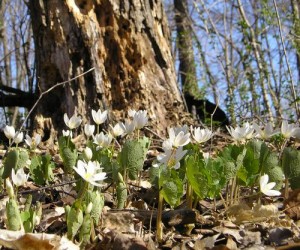Beltane Waxing Flower Moon
Windows Without Walls. Microsoft has this new advertising slogan. I keep wondering if they realize that without walls there are no windows?
2 hours today for my baby plants getting ready to head out to the garden. They’re done right now and I have to go get them before my treadmill workout.
As I passed over the Mississippi on the way out to the endodontist this morning, I noticed a tree with an American flag attached to a branch, fluttering. Somehow the artlessness of it reminded me of days gone by, of a world in which there were fewer right angles, fewer stone bridges and no steel and concrete ones, no cars. This triggered a revery at first between art and artifice which went away almost as quick as it came. Not the point.
What was the point? Permaculture has something to do with it. So does our very American and persistent yearning to return to the land, to become one with nature. This flag without a flag pole, without dramatic lighting suggested this. What was there here?
The red car sped along Highway 252 headed toward Highway 100. The reflections kept coming. Nature and artifice. No. Not nature and artifice. Nature and the human drive to build and decorate, artifice. Both natural. Then, the city, where I feel such energy and hope, and our home with its orchard and vegetable beds, its perennial flowers like the tulips and daffodils up now, where I also feel energy and hope, these two must walk together. The tight gathering of humans and their shelters is no different from the mud daubed home of the wasps or the cave of the hibernating bear. Likewise humans earning their food from mother earth is no different from the bass dining on minnows or the moose eating duckweed from a wilderness lake.
Yes, that was it. The flag on the tree branch reminded me that we humans and, all of what we do, are natural. This whole earth in the balance rhetoric is wrong; it is not earth that is in the balance, it is rather humankind. We may live in such a way that we eliminate our own niche. It has happened before and it will happen again, naturally.

